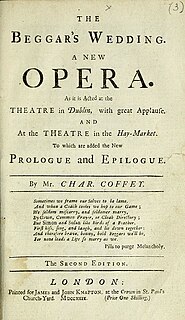
The ballad opera is a genre of English stage entertainment that originated in the early 18th century, and continued to develop over the following century and later. Like the earlier comédie en vaudeville and the later Singspiel, its distinguishing characteristic is the use of tunes in a popular style with spoken dialogue. These English plays were 'operas' mainly insofar as they satirized the conventions of the imported opera seria. Music critic Peter Gammond describes the ballad opera as "an important step in the emancipation of both the musical stage and the popular song."
Charles Coffey was an Irish playwright, opera librettist and arranger of music from Westmeath.
William Rufus Chetwood was an English or Anglo-Irish publisher and bookseller, and a prolific writer of plays and adventure novels. He also penned a valuable General History of the Stage.
The Wife of Bath is a 1713 comedy play by the British writer John Gay. It was inspired by the The Wife of Bath's Tale by Geoffrey Chaucer. The play marked a conscious switch by Gay towards an apolitical and distant past, after his contemporary work The Mohocks had faced controversy and censorship the previous year. Robert Wilks, a celebrated actor and manager of the Drury Lane Theatre, appeared as Chaucer. The title role of the wife was played by Margaret Bicknell with Mary Porter as Myrtilla and the cast rounded out by William Bullock, Lacy Ryan, Christopher Bullock, William Pinkethman, Susanna Mountfort and Henry Norris.
The What D'Ye Call It is a 1715 farce by the British writer John Gay. It was written as a parody of tragic plays, with particular reference to Thomas Otway's Venice Preserv'd.
Money the Mistress is a 1726 comedy play by the Irish writer Thomas Southerne. It was his final play.
The Half-Pay Officers is a 1720 comedy play by the Irish writer Charles Molloy. The play included popular scenes from Henry V, Much Ado About Nothing and Love and Honour. It proved popular with audiences and was revived on a number of occasions. It premiered with the farce Hob's Wedding as an afterpiece.
Gabriel Odingsells (1690–1734) was a British playwright.
Hibernia Freed is a 1722 tragedy by the writer William Phillips. It is set during the ninth century during the Viking Invasion of Ireland. It was part of a growing Anglo-Irish interest in traditional Irish history, and part of a tendency to switch tragedy from Ancient Rome or Greece to more native settings.
Hob's Wedding is a 1720 farce by the Irish writer John Leigh.

The Village Opera is a 1729 ballad opera by the British writer Charles Johnson. It was part of a group of ballad operas produced in the wake of the great success of John Gay's The Beggar's Opera.

The Beggar's Wedding is a 1729 ballad opera by the Irish writer Charles Coffey. Part of a boom in ballad operas following the success of John Gay's The Beggar's Opera, it originally premiered at the Smock Alley Theatre in Dublin in March 1729 before appearing in London at the Haymarket Theatre on 29 May 1729 The original Dublin cast included Richard Elrington.

Love in a Riddle is a 1729 ballad opera by the British actor-manager Colley Cibber. It was part of a boom in ballad operas inspired by the enormous success of John Gay's The Beggar's Opera the previous year.
Bayes's Opera is a 1730 ballad opera by the British writer Gabriel Odingsells. It was part of a boom in ballad operas that followed in the wake of the susccess of John Gay's The Beggar's Opera.
Sylvia is a 1730 ballad opera by the British writer George Lillo, written as part of a boom in ballad operas in the wake of John Gay's 1728 hit The Beggar's Opera.
Themistocles, the Lover of His Country is a 1729 tragedy by the Irish writer Samuel Madden. It is based on the life of the Ancient Greek general Themistocles.
The Married Philosopher is a 1732 comedy play by the writer John Kelly. It was inspired by the 1727 play Le Philosophe Marié by the French writer Philippe Néricault Destouches.
The Man's Bewitched is a 1709 comedy play by the British writer Susanna Centlivre. It is known by the longer title The Man's Bewitch'd; or, The Devil to do about Her.
The Lying Lover; Or, The Lady's Friendship is a 1703 comedy play by the Irish writer Richard Steele. It was his second play, written while he was an army office doing garrison duty in Harwich during the War of the Spanish Succession. It is described as being both a restoration comedy and a sentimental comedy, and marked the transition between the two.
The Devil of a Wife; Or, A Comical Transformation is a 1686 comedy play by the English writer and actor Thomas Jevon. It was first performed by the United Company at the Dorset Garden Theatre in London.




